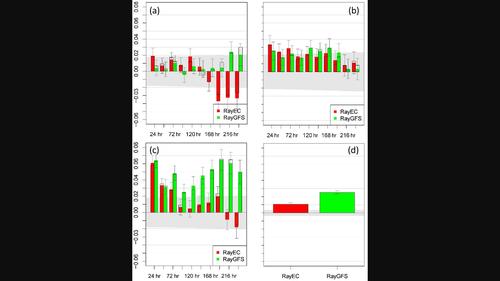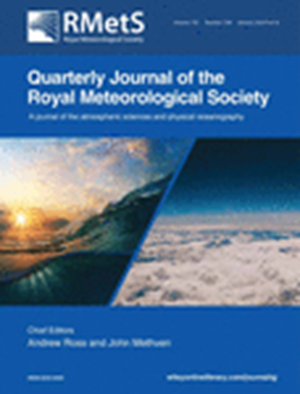On the Use of Consistent Bias Corrections to Enhance the Impact of Aeolus Level‐2B Rayleigh Winds on NOAA Global Forecast Skill
IF 3
3区 地球科学
Q2 METEOROLOGY & ATMOSPHERIC SCIENCES
引用次数: 0
Abstract
Abstract The operational Aeolus Level‐2B (L2B) horizontal line‐of‐sight (HLOS) retrieved Rayleigh winds, produced by the European Space Agency (ESA), utilize European Centre for Medium‐Range Weather Forecasts (ECMWF) short‐term forecasts of temperature, pressure, and horizontal winds in the Rayleigh–Brillouin and M1 correction procedures. These model fields or backgrounds can contain ECMWF model‐specific errors, which may propagate to the retrieved Rayleigh winds. This study examines the sensitivity of the retrieved Rayleigh winds to the changes in the model backgrounds, and the potential benefit of using the same system, in this case the National Oceanic and Atmospheric Administration's Finite‐Volume Cubed Sphere Global Forecast System (FV3GFS), for both the corrections and the data assimilation and forecast procedures. It is shown that the differences in the model backgrounds (FV3GFS minus ECMWF) can propagate through the Level‐2B horizontal line‐of‐sight Rayleigh wind retrieval process, mainly the M1 correction, resulting in differences in the retrieved Rayleigh winds with mean and standard deviation of magnitude as large as 0.2 m·s −1 . The differences reach up to 0.4, 0.6, and 0.7 m·s −1 for the 95th, 99th, and 99.5th percentiles of the sample distribution with maxima of ∼1.4 m·s −1 . The numbers of the large differences for the combined lower and upper 5th, 1st, and 0.5th percentile pairs are ∼6,100, 1,220, and 610 between 2.5 and 25 km height globally per day respectively. The ESA‐disseminated Rayleigh wind product (based on the ECMWF corrections) already shows a significant positive impact on the FV3GFS global forecasts. In the observing system experiments performed, compared with the ESA Rayleigh winds, the use of the FV3GFS‐corrected Rayleigh winds lead to ∼0.5% more Rayleigh winds assimilated in the lower troposphere and show enhanced positive impact on FV3GFS forecasts at the day 1–10 range but limited to the Southern Hemisphere.

关于使用一致偏差校正来增强风级- 2B瑞利风对NOAA全球预报技能的影响
由欧洲空间局(ESA)制作的Aeolus Level - 2B (L2B)水平视线(HLOS)反演瑞利风,利用欧洲中期天气预报中心(ECMWF)在瑞利-布里渊和M1校正程序中对温度、压力和水平风的短期预报。这些模式场或背景可能包含ECMWF模式特有的错误,这些错误可能会传播到检索到的瑞利风。本研究考察了反演的瑞利风对模式背景变化的敏感性,以及使用同一系统(在本例中是美国国家海洋和大气管理局的有限体积立方球全球预报系统(FV3GFS))进行校正、数据同化和预报程序的潜在好处。结果表明,模式背景(FV3GFS减去ECMWF)的差异可以通过水平2B级视线瑞利风反演过程(主要是M1校正)传播,导致反演的瑞利风的平均值和标准差高达0.2 m·s−1。在样品分布的第95、99和99.5百分位数上,差异达到0.4、0.6和0.7 m·s−1,最大值为~ 1.4 m·s−1。在全球每天2.5 ~ 25 km高度之间,5、1、0.5百分位对的上下组合差异较大的数量分别为6100、1220和610。ESA传播的瑞利风产品(基于ECMWF修正)已经显示出对FV3GFS全球预报的显著积极影响。在进行的观测系统实验中,与ESA瑞利风相比,使用FV3GFS校正的瑞利风导致对流层低层吸收的瑞利风增加了约0.5%,并对FV3GFS在1-10天范围内的预报显示出增强的积极影响,但仅限于南半球。
本文章由计算机程序翻译,如有差异,请以英文原文为准。
求助全文
约1分钟内获得全文
求助全文
来源期刊
CiteScore
16.80
自引率
4.50%
发文量
163
审稿时长
3-8 weeks
期刊介绍:
The Quarterly Journal of the Royal Meteorological Society is a journal published by the Royal Meteorological Society. It aims to communicate and document new research in the atmospheric sciences and related fields. The journal is considered one of the leading publications in meteorology worldwide. It accepts articles, comprehensive review articles, and comments on published papers. It is published eight times a year, with additional special issues.
The Quarterly Journal has a wide readership of scientists in the atmospheric and related fields. It is indexed and abstracted in various databases, including Advanced Polymers Abstracts, Agricultural Engineering Abstracts, CAB Abstracts, CABDirect, COMPENDEX, CSA Civil Engineering Abstracts, Earthquake Engineering Abstracts, Engineered Materials Abstracts, Science Citation Index, SCOPUS, Web of Science, and more.

 求助内容:
求助内容: 应助结果提醒方式:
应助结果提醒方式:


